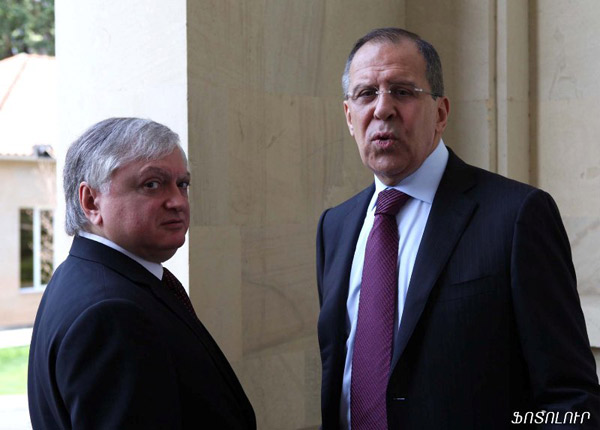When even Nalbandian cannot be silent on Russia’s arming Azerbaijan
February 22, Armenian Foreign Minister Edward Nalbandian was on an official visit to Moscow. With Russian Foreign Minister Sergei Lavrov he discussed foreign policy co-ordination, the UN, OSCE, CSTO, EaEU, CIS and other international multifaceted issues in relation to cooperation in another platform, international and regional urgent issues, the situation in the Middle East, and the efforts to resolve the Syrian crisis. As for the Karabakh issue, the Armenian and Russian Foreign Ministers share the same opinion that there is no alternative for the settlement of the Karabakh conflict, they stressed the importance of unreserved implementation of the tripartite agreements for the establishment of 1994-1995 open-end truce, the inadmissibility of the use of force or a threat of force, the necessity to implement the agreements reached in the summits in Vienna and St. Petersburg.
Lavrov handed to Nalbandyan the Order of Friendship awarded by Russian President Vladimir Putin to the RA Foreign Minister. Prior to summarizing the talks, the RF Foreign Ministry official representative Maria Zakharova promised an “interesting thing.” The “interesting” news perhaps was that a new procedure of visiting Armenia for Russian citizens entered into force on February 23: the Russian citizens can enter Armenia with their country passports. Apropos, in his turn, Edward Nalbandian awarded Medals of Honor of the MFA of Armenia to Vasily Nebenzya (Deputy Minister of Foreign Affairs of the Russian Federation), Mikhail Yevdokimov (Director of the First CIS Department), Alexey Pavlovsky (Director of Fourth CIS Department), Maria Zakharova (Director of Press and Information Department), and Yevgeny Ivanov (Director of Consular Department).
Here, it’s worth reminding that a few days ago, the Russian Ambassador to Azerbaijan, unlike the US Ambassador to other countries, accepted the invitation of the Azerbaijani government and visited Jojuk Merjanli, while according to the official statement of the Azerbaijani Deputy Prime Minister, the purpose of bringing the diplomats to Jojuk Merjanli, was to notify them about the atrocities of Armenians, in addition to familiarizing them with the construction works. Earlier, in early February, Maria Zakharova applauded Aliyev’s formed false “peace platform” initiative: the “Armenia-Azerbaijan Platform for Peace” and appreciated it highly. However, such minor issues perhaps have not obstructed the Armenian-Russian talks, and the RA Foreign Minister has once again stated the fact that the official Yerevan and Moscow have reached a “full mutual understanding”.
Read also
The only exception ahead of the Nalbandyan-Lavrov meeting was a statement of Nalbandyan in the interview with “RIA Novosti”, “Of course, we cannot approve the fact that Azerbaijan is purchasing weapons from our ally who puts much effort (both in cooperation with Armenia and as a Minsk Group Co-Chair) in maintaining peace and stability in the region.” He also added that Armenia should make efforts to maintain the balance of forces. And perhaps, this is the case even when Nalbandyan cannot remain silent on Russia’s constantly arming Azerbaijan against the background of general discontent in Armenia. Anyway, Nalbandian and Lavrov have discussed the details of the situation created around Nagorno-Karabakh which Lavrov has described as a “bad emotional situation.”
Russian Foreign Minister has made a remarkable statement, “There is no alternative to the format of the OSCE Minsk Group on the Nagorno-Karabakh conflict settlement and added, “A similar document was adopted during the recent Security Conference in Munich which clearly states that the use of force and military rhetoric within the frames of the conflict settlement are unacceptable, and emphasized the necessity to fully implement the agreements reached in Vienna and St. Petersburg.” Later, Lavrov stressed that the mediators, including Russia, will take steps which will allow first of all to change the “bad emotional atmosphere” and then discuss the specific recommendations that are put on the table of negotiations by Russia, which are supported by the United States and France. It can also be assumed that Moscow will come up with an initiative to organize new tripartite meetings.
It is not excluded that in the coming days, Lavrov would discuss the issues of organizing such a meeting during Mammadyarov’s upcoming visit to Moscow. On the one hand, it is good for the Armenian side when Lavrov is stating that there is no alternative to the OSCE Minsk Group format, however, everyone clearly knows that the “steering wheel” of the settlement is still in the hands of Moscow, the initiatives are coming from Moscow. This was also stated by the RA Defense Minister Vigen Sargsyan in his interview with “Ria Novosti” news agency.
Referring to the situation along the line of contact, he noted, “We believe that Armenia and Azerbaijan must fulfill all the agreements that were reached at the summits in St. Petersburg and Vienna, with the mediation of the OSCE Minsk Group co-chairs and personally Russian president.” After the four-day in April, reminding the agreements reached in Vienna and St. Petersburg certainly strengthens the Armenian side, especially since they are stated by the mediation countries. The painful side is that Azerbaijan is consistently rejecting them, and the ways on how to reach Azerbaijan’s consent on this is not visible.






















































